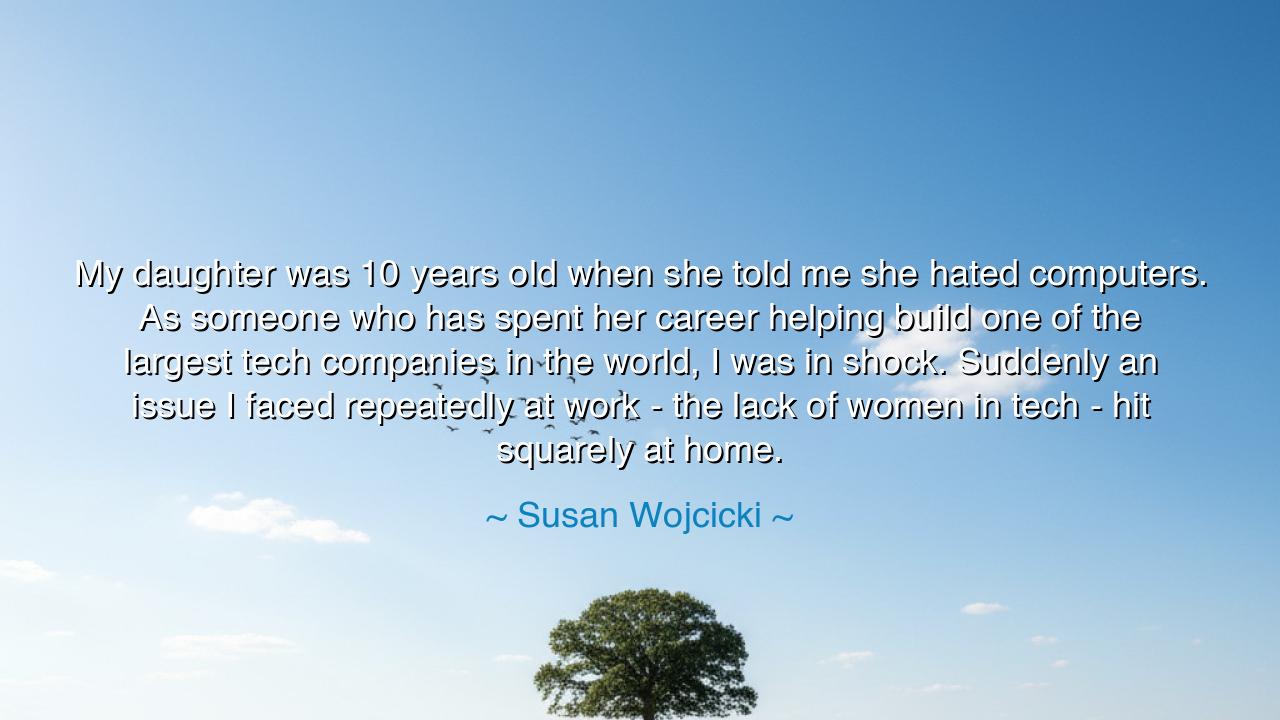
My daughter was 10 years old when she told me she hated
My daughter was 10 years old when she told me she hated computers. As someone who has spent her career helping build one of the largest tech companies in the world, I was in shock. Suddenly an issue I faced repeatedly at work - the lack of women in tech - hit squarely at home.






Hearken, O children of generations yet unborn, and attend to the words of Susan Wojcicki, who spoke of a revelation that struck not in the halls of power, but within the sanctity of her home: “My daughter was 10 years old when she told me she hated computers. As someone who has spent her career helping build one of the largest tech companies in the world, I was in shock. Suddenly an issue I faced repeatedly at work - the lack of women in tech - hit squarely at home.” In these words lies the eternal truth that societal inequities, when left unchecked, ripple into the most intimate corners of our lives, and that even the highest accomplishments cannot shield us from the shadows they cast.
Consider first the shock of recognition. Wojcicki, who had guided technological empires and shaped the digital landscape, felt the sting of a truth she had long observed but now encountered in her own child. The declaration of a young girl, “I hate computers,” became a mirror, reflecting centuries of bias, omission, and social constructs that discouraged the participation of women in fields of innovation. It is as though the mighty walls of achievement are suddenly pierced by the gentle voice of innocence, reminding all that the struggles of society are not abstract—they are lived experiences.
The words also speak to the interplay of legacy and inheritance. Wojcicki’s daughter had inherited not only a name and presence in a world of technology but also the subtle weight of cultural expectation and gendered perception. This tension echoes the ancient lessons of Herodotus and Plutarch, where the fate of a generation often bore the consequences of the actions—or inactions—of their predecessors. The lack of representation in tech was not merely an organizational issue; it had become a personal and moral challenge, a call to action that could no longer be deferred.
Reflect upon history: Marie Curie, who broke barriers in science despite prevailing societal norms, often remarked upon the isolation and skepticism she faced as a woman in her field. Her perseverance illuminated the path for others, yet countless young minds remained unaware or discouraged from following in her footsteps. Wojcicki’s realization is a modern echo of this truth: systems of exclusion, once ingrained, affect not only professionals but the children who observe them, shaping aspirations and self-perception.
There is a deeper wisdom in Wojcicki’s reflection: to recognize inequity is not enough; one must also respond. The moment when her daughter voiced her disinterest in computers is both alarm and invitation, a signal that advocacy, mentorship, and tangible support are necessary to cultivate a generation unbound by historical biases. Like the philosophers who guided students through moral and intellectual awakening, leaders must nurture curiosity, confidence, and access, ensuring that talent and potential are not confined by societal expectation.
From this, a timeless lesson emerges: the barriers we tolerate in our professions and communities echo in the lives of our children, shaping the future before it has even begun. Advocacy for equity is not merely policy; it is an act of care, a shaping of worlds that ensures young minds can embrace possibility without fear or limitation. The voice of one child can awaken the conscience of a generation, just as Wojcicki’s daughter awakened hers.
Practical action flows naturally from this insight. Encourage young people, especially those historically underrepresented, to explore fields that inspire them. Mentor, guide, and provide opportunities that counteract structural bias. Celebrate curiosity, resilience, and learning, and ensure that the doors of knowledge remain open to all, regardless of gender or circumstance. In doing so, you honor not only individual potential but the collective future of innovation and human achievement.
Finally, remember the eternal truth: progress is measured not only in technological triumphs or corporate conquest, but in the capacity to reshape minds, dismantle barriers, and nurture the next generation. Wojcicki’s reflection is a call to recognize the power and responsibility we bear: to see inequity, to confront it, and to ensure that the children of tomorrow inherit a world where passion, curiosity, and ambition are not limited by societal constraint.






AAdministratorAdministrator
Welcome, honored guests. Please leave a comment, we will respond soon